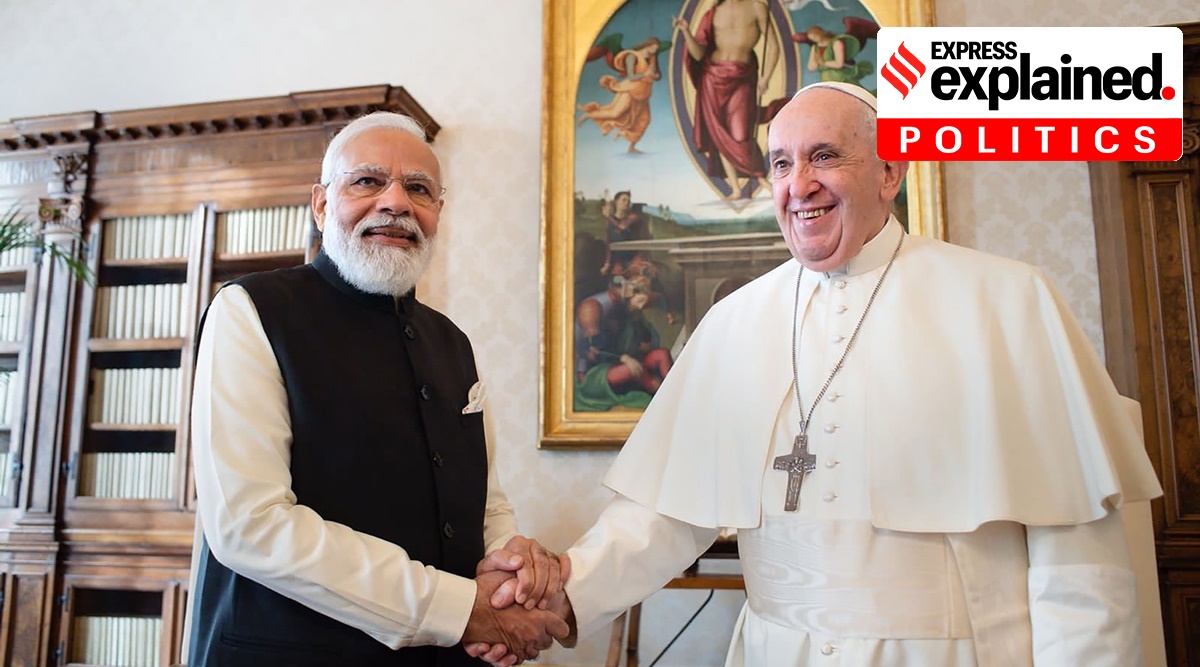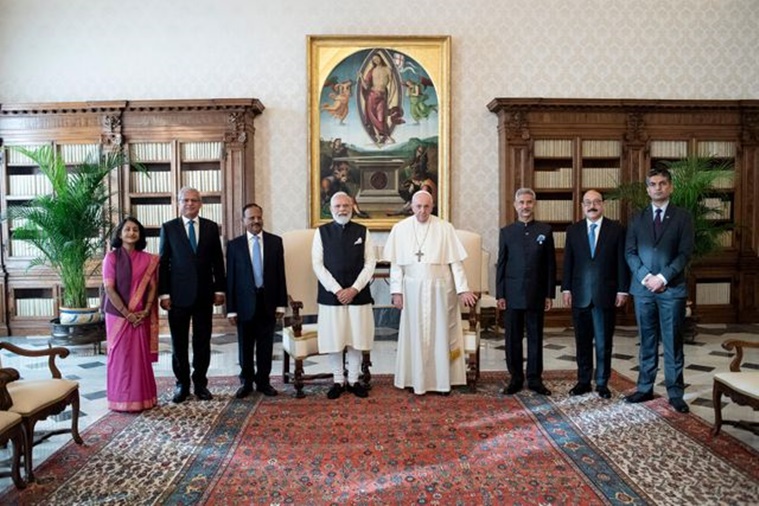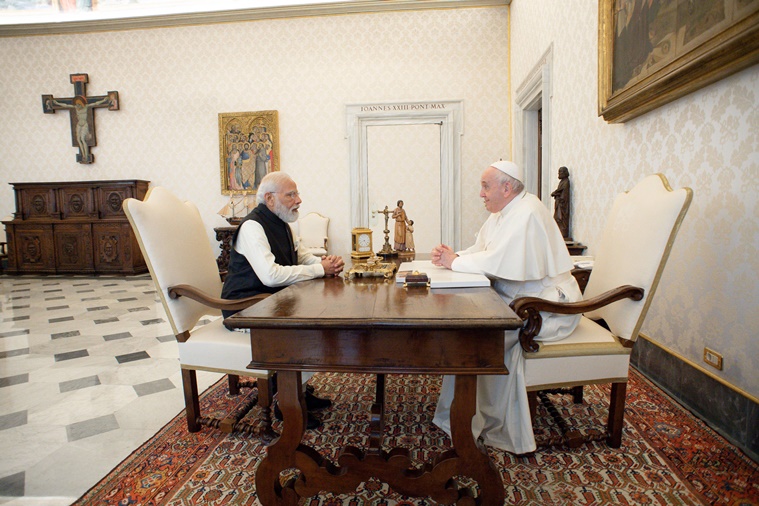The party views the Christian community as a prospective support base to retain power in poll-bound Manipur and Goa, even as it attempts to turn into a formidable electoral force in Kerala
With Christians being a community that the party wants to establish as its support base to retain power in poll-bound Goa and Manipur and to emerge as a formidable electoral force in Kerala, Prime Minister Narendra Modi’s meeting with Pope Francis, the head of the Roman Catholic Church, and his invitation to the Pontiff to visit India assumes much significance, sources in the BJP said.
There have been some voices of concern raised from within the Christian community cautioning Church leaders who have been trying to get closer to the BJP, even as the top clergy – including some from among the most influential Roman Catholics – has expressed keenness in engaging with the party brass at the Centre and in Kerala. Sources said there have been a series of dialogues between the two in Kerala in the last few months.
The Prime Minister’s “warm meeting” with the Pope was welcomed by the Church. Major Archbishop Baselios Cardinal Cleemis, who headed the Catholic Bishops Conference of India (CBCI) and who had requested Modi to invite the Pope to India in 2014, saw it as a fresh opportunity for dialogue between the government and the community. “This has a historical importance,” Cardinal Cleemis said about Saturday’s meeting.
“The meeting should not be seen merely as the one between two country heads, rather it was the head of the largest democracy and an ancient culture of the world meeting the head of the largest religious community in the world. This brings in hope for enhancing human fraternity and caring for the poor, because that’s what Christianity stands for. It would bring in positive efforts in India for a mutual trust and collaboration between people of different religious groups. It would also contribute to the very need for dialogues. We are very delighted that the Prime Minister has opened ways for a Papal visit to India,” the cardinal told The Indian Express.
The welcome note by Cardinal Cleemis and earlier by Cardinal George Alencherry, President of the Kerala Catholic Bishops Conference (KCBC), have rekindled the BJP’s hopes on building confidence in the community towards the party, leaders said.
Prospective support base
For the BJP, the community – which forms the third-largest religious group after Hindus and Muslims – is a “prospective support base,” said a party leader. “The Goa experience has taught BJP that the majority of the Hindus and a section of Christians could make a formidable vote base for us, be it in the case of Kerala, Manipur or other north-eastern states.” The disintegration of the Congress as a political force in these states, he said, could help the BJP as the community is “losing its confidence” in that party as an electoral force.

Congress in decline, hostile CPI(M)
“The decline of the Congress and hostile attitude of the CPI(M) towards many factions of the community, particularly the Orthodox Church, the sharing of minority reservation benefits on which the CPI(M) has taken an explicitly pro-Muslim stand, as well as the love jihad issue in which the political spectrum in Kerala tried to corner the Pala bishop, have created a conducive atmosphere for the BJP in Kerala. There is a rethinking in large segments of the community,” said R Balashankar, co-convener of Training Program and Publication in the national BJP.
“The experience of the community in Goa, where it is a very significant political force, and also the Christian majority in the north-east, where the BJP is sharing power with pro-Christian regional political groups, have generated a great level of confidence in the community,” Balashankar said.
Unease over growing IUML influence
The BJP has undertaken a series of initiatives to earn the trust of the community in Kerala. Last year, PM Modi held meetings with bishops belonging to various denominations. In the meetings, organised by former BJP Kerala chief and current Goa Governor S Sreedharan Pillai, the PM heard their grievances, including concerns about Muslim students availing over 80 per cent of the minority scholarships and on the “increasing number of Christian girls lured by Muslim boys” in alleged cases of “love jihad” in the state. Balashankar himself had intervened to save a 1,000-year-old church in the state’s Alappuzha district from demolition to widen a national highway, which had created goodwill among those in the Malankara Orthodox Syrian Church.
The Church and a section of community leaders in Kerala, so far lenient towards the Congress-led UDF in their political choices, have been uneasy over the increasing influence of the Indian Union Muslim League in the United Democratic Front (UDF), the Opposition coalition in the state. The Pinarayi Vijayan-led government was forced to restructure the 80:20 (Muslims: Christians) ratio for distribution of minority scholarships, based on the 2011 census, after the Kerala High Court scrapped the formula. Church leaders had demanded 40 per cent of the scholarships according to its population, but the state provided only 20 per cent before the court intervened.
Voices of concern
While the leaders were getting cosy with each other, there have been voices of concern from the community. Sathyadeepam, a publication of the Syro Malabar Church which is the most influential group among the Roman Catholics, has come out against the latest developments. Alleging that “vested interests” in the Church leadership were making compromises with the BJP-RSS leadership despite increasing attacks against the community, the weekly criticised that the leadership failed to raise the issue of attacks against the community and its institutions in other parts of the country.
A joint fact-finding team of non-governmental organisations, including the Association for the Protection of Civil Rights, United Against Hate and United Christian Forum, recently presented a report – after visiting Uttar Pradesh and Uttarakhand – which pointed out a series of attacks against Christians and churches in these states. Sources in the Catholic Church in the national capital said the influential Kerala Church has been ignoring the attacks against the community in northern parts of the country.
‘Time to shed diplomacy’
Pointing out that minorities, both Christians and Muslims, have been the “subject of consistent attacks” by right-wing forces since the BJP came into power in 2014, Father Suresh Mathew, editor of church publication Indian Currents said, “BJP has spared no efforts and even supported every attack and hate speech against Christians. Several states have enacted anti-conversion laws which are in violation of the Constitution. The BJP government in Karnataka recently initiated an unconstitutional survey of Christian worshipping places (on hold for the time being). Bishops, priests and lay groups should be aware of the dangerous situation. Time has come for the Church leadership in India to shed diplomacy and express their concern for religious freedom and human rights protection,” Fr Mathew said.
Newsletter | Click to get the day’s best explainers in your inbox
While Christians in Kerala comprise 18.38 per cent of its population, in Goa it is 25.1 per cent while the figure is 41.2 per cent in Manipur. Both Manipur and Goa are headed for polls early next year. Despite its desperate attempts, the BJP’s vote share has gone down from 15.53 per cent (2019) to 12.47 per cent in the Assembly elections held on April 6 this year. Political observers pointed out that the fall in vote share indicated that there was no overwhelming support for the party’s candidates from the Christian community.
Source: Read Full Article




